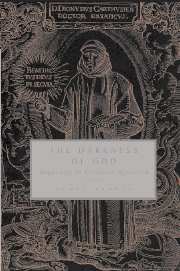Book contents
- Frontmatter
- Contents
- Acknowledgements
- Introduction
- PART ONE TWO SOURCES AND A SYNTHESIS
- PART TWO DEVELOPMENTS
- 6 Eckhart: God and the self
- 7 Eckhart: detachment and the critique of desire
- 8 The Cloud of Unknowing and the critique of interiority
- 9 Denys the Carthusian and the problem of experience
- 10 John of the Cross: the dark nights and depression
- 11 From mystical theology to mysticism
- Further reading
- Index
9 - Denys the Carthusian and the problem of experience
Published online by Cambridge University Press: 23 November 2009
- Frontmatter
- Contents
- Acknowledgements
- Introduction
- PART ONE TWO SOURCES AND A SYNTHESIS
- PART TWO DEVELOPMENTS
- 6 Eckhart: God and the self
- 7 Eckhart: detachment and the critique of desire
- 8 The Cloud of Unknowing and the critique of interiority
- 9 Denys the Carthusian and the problem of experience
- 10 John of the Cross: the dark nights and depression
- 11 From mystical theology to mysticism
- Further reading
- Index
Summary
In the middle of the fifteenth century, at the very end of the mediaeval period, Denys the Carthusian, a Flemish monk of extraordinary learning and of distinctly conservative theological disposition, looked back upon the preceding twelve hundred years of theological writing about ‘contemplation’ and attempted a compendious survey and an assessment. Denys' De Contemplatione is an eclectical work; it makes few claims to originality, but rather attempts to reconcile conflicting positions within the history of Patristic and mediaeval mystical writing. In particular he is concerned to effect a reconciliation on the issue which had so often preoccupied late mediaeval mystics, and as often distracted them from their main purposes: the issue of ‘intellectualist’ as against ‘Voluntarist’ accounts of ‘union with God’. For his own part Denys' acknowledged sources of influence are principally his namesake Denys the Areopagite and his compatriot Jan Van Ruusbroec. But what is of interest to us in this chapter is less the distinctiveness of Denys' theology – which admittedly is not great – than the character of De Contemplatione as a survey of the history of Western Christian mysticism in the Middle Ages; and this the more particularly since his interests, as ours have been, are focused upon the apophatic traditions of mediaeval Christian mysticism.
- Type
- Chapter
- Information
- The Darkness of GodNegativity in Christian Mysticism, pp. 211 - 225Publisher: Cambridge University PressPrint publication year: 1995
- 3
- Cited by



